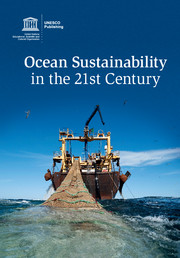Book contents
- Frontmatter
- Contents
- List of contributors
- Acronyms and abbreviations
- Foreword by Irina Bokova, Director-General of UNESCO
- Foreword by Thomas E. Lovejoy
- Preface
- Acknowledgements
- 1 Issues regarding oceans and opportunities: an introduction to the book
- 2 Main human uses of ocean areas and resources, impacts, and multiple scales of governance
- 3 Physical and chemical changes in the ocean over basin-wide zones and decadal or longer time-scales: perspectives on current and future conditions
- 4 Knowledge and implications of global change in the oceans for biology, ecology, and ecosystem services
- 5 A new perspective on changing Arctic marine ecosystems: panarchy adaptive cycles in pan-Arctic spatial and temporal scales
- 6 Ecosystem approach and ocean management
- 7 Challenges in using valuation in ecosystem-based management in a marine context: the case of UK Marine Protected Area designation
- 8 The contribution of international scientific cooperation and related institutions to effective governance for the oceans: the cases of regional tsunami early warning systems and the Argo project
- 9 Emerging and unresolved issues: the example of marine genetic resources of areas beyond national jurisdiction
- 10 The assumption that the United Nations Convention on the Law of the Sea is the legal framework for all activities taking place in the sea
- 11 The legal regime of outer space in light of the Law of the Sea
- 12 Towards sustainable oceans in the 21st century
- Index
Preface
Published online by Cambridge University Press: 05 May 2015
- Frontmatter
- Contents
- List of contributors
- Acronyms and abbreviations
- Foreword by Irina Bokova, Director-General of UNESCO
- Foreword by Thomas E. Lovejoy
- Preface
- Acknowledgements
- 1 Issues regarding oceans and opportunities: an introduction to the book
- 2 Main human uses of ocean areas and resources, impacts, and multiple scales of governance
- 3 Physical and chemical changes in the ocean over basin-wide zones and decadal or longer time-scales: perspectives on current and future conditions
- 4 Knowledge and implications of global change in the oceans for biology, ecology, and ecosystem services
- 5 A new perspective on changing Arctic marine ecosystems: panarchy adaptive cycles in pan-Arctic spatial and temporal scales
- 6 Ecosystem approach and ocean management
- 7 Challenges in using valuation in ecosystem-based management in a marine context: the case of UK Marine Protected Area designation
- 8 The contribution of international scientific cooperation and related institutions to effective governance for the oceans: the cases of regional tsunami early warning systems and the Argo project
- 9 Emerging and unresolved issues: the example of marine genetic resources of areas beyond national jurisdiction
- 10 The assumption that the United Nations Convention on the Law of the Sea is the legal framework for all activities taking place in the sea
- 11 The legal regime of outer space in light of the Law of the Sea
- 12 Towards sustainable oceans in the 21st century
- Index
Summary
Humans are generally conscious of the value of the world ocean: no ocean, no life; a thriving ocean, a thriving humankind. Yet, when it comes to acting in a sustainable manner in our relationship with the ocean, we are often at a loss; it appears that the scale and pace of human action do not match the pace and scale of ocean processes well enough for the two to counterbalance and act synergistically. It appears that, from a lack of consciousness about what is right and what should be done, we prefer not to act. And it also appears that because of shortsightedness in terms of the human print on the ocean environment and life therein – and really ‘shortsightedness’ is the word, because the ocean is often out of sight – we comfortably (or less comfortably) hide behind our incapacity to see fully and to understand how increasingly modified and degraded the world ocean is, and we hope that it will recover by itself.
The world's oceans cover approximately 71% of the planet's surface, with an estimated volume of 1,335 billion cubic kilometres (Eakins and Sharman, 2010). It is difficult to grasp the meaning of such immense figures. Intuitively, however, we all realize that such a large surface and volume must contribute substantially to the Earth's climatic balance. We also now know that life in the oceans is present all the way from the surface to its deepest areas. Evolutionary biology has demonstrated that the oceans have played a major role in the origin and shaping of life on Earth. Over historical time, humans have always depended greatly on the oceans for food, health, transportation, trade, and recreation – among other uses (Independent World Commission on the Oceans, 1998; cf. also Chapter 2 of this book). In turn, a healthy ocean cannot be without proper management in light of the fact that over seven billion humans live on the planet today.
- Type
- Chapter
- Information
- Ocean Sustainability in the 21st Century , pp. xxiii - xxviPublisher: Cambridge University PressPrint publication year: 2015



